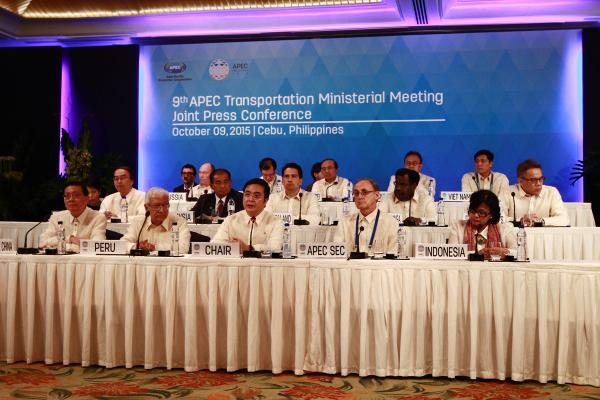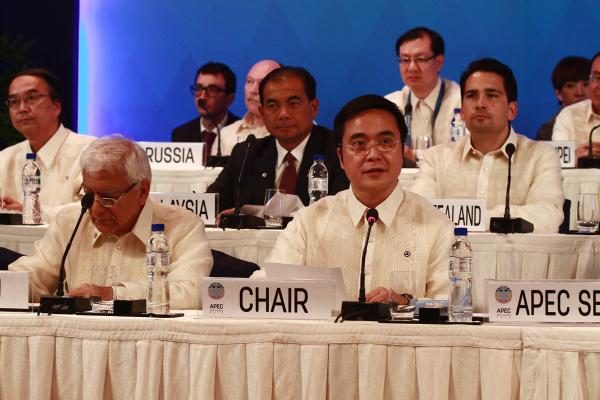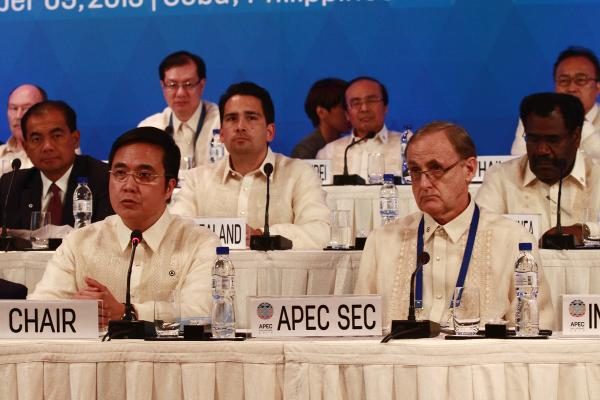SUMMARY
This is AI generated summarization, which may have errors. For context, always refer to the full article.

CEBU, Philippines – All 21 Asia-Pacific Economic Cooperation (APEC) member-economies approved on Friday night, October 10, initiatives by the Philippines pushing for women leadership in the male-dominated transport sector and a more bike-friendly region.
Inclusive mobility includes development of sidewalks, and encouraging walking and biking as the first two modes of transportation.
These two initiatives endorsed by the Philippine government were the focus of the 9th APEC Transportation Ministerial Meeting here in Cebu.
“We are now committing to conduct studies and come up with frameworks that will address the gaps in boosting women participation in the transport sector as well as enhancing inclusive mobility in the region, which will then be tackled in Peru next year,” Philippine Transportation Secretary Joseph Emilio Abaya said during the open forum.
Encouraging women participation

During the first leg of the 9th APEC Transportation Ministerial Meeting, the APEC Business Advisory Council (ABAC) urged the transport sector of all APEC member-economies to promote women’s rights and equal rights, regardless of gender, ABAC Chairwoman Doris Magsaysay-Ho said in her speech.
“They must create an environment that celebrates the uniqueness of women,” Magsaysay-Ho, the CEO of the country’s largest manning company Magsaysay Maritime Incorporated, said.
She added that women are having the opportunity to enter the shipping sector, which has been considered a man-dominated sector, amid a shortage of top officers among ship managers.
But Magsaysay-Ho pointed out that based on the Filipino experience, the promotion cycle of a seafarer takes at least 10 years.
Abaya admitted that the economy has “a long way to go in terms of enhancing women’s role” in the sector.
Abaya enumerated 5 pillars in attaining the target such as training and hiring of women in the transportation sector, enhancing the condition of the workforce, advocating women leadership, and assuring safe use and access to transportation.
Inclusivity

Other than advocating women’s participation in the transport sector, the Philippines also urged all member-economies to act together and make the APEC region more bike-friendly. (READ: PH to APEC economies: Let’s make our region bike-friendly)
“Advancing inclusive mobility means addressing the transportation requirements of all, especially those in vulnerable sectors of our society – the persons with disability, women, children, and the elderly. Improving mobility translates to increased productivity which helps accelerate economic progress,” Abaya said in his speech.
Now that the initiative is accepted by all member-economies, Philippine Transportation Assistant Secretary Sherielysse Reyes Bonifacio said her department will now get a “consultant to develop the framework for the APEC region.”
“One behavior of Filipinos is we love door-to-door service. We don’t want to walk because of our weather, but in other tropical countries like Thailand and Vietnam, they are more open to taking the public transport and then walking the last mile,” Bonifacio told reporters on the sidelines of the forum.
For the Philippines, Bonifacio said her agency will push for “pedestrianism,” starting with a project that will connect Ortigas area’s Metro Rail Transit Line 3 to the malls and financial district through walkways.
“Right now it’s more LGU (local government unit)-based. We need to scale that up to make it more nationwide,” Bonifacio said.
Sustainable mobility
The local transportation department will establish guidelines for a bike-sharing program that is customized to the Asian experience, instead of adopting the European or North American models.
Bonifacio also recognized that the Philippines lacks the “institutional set-up” that would make mobility sustainable.
“It is easy to create a road, but the question is who will manage it. These are the issues with gaps so we have to sit down and discuss, and that is where the inclusive mobility framework comes in,” Bonifacio said.
For Abaya, there is still a lack of investment in the transport sector, with trillions of dollars still lacking as populations grow in the region.
“APEC economies should continue to invest in transportation and mass transit system. Safe and efficient transportation is important as we believe mobility allows an economy to maximize potential,” Abaya, who is the chairman of the 9th APEC Transportation Ministerial Meeting, said. – Rappler.com
Add a comment
How does this make you feel?
There are no comments yet. Add your comment to start the conversation.